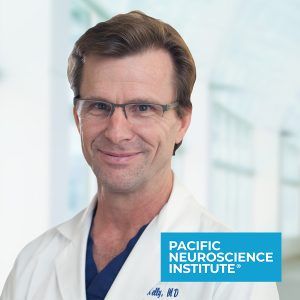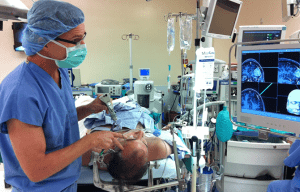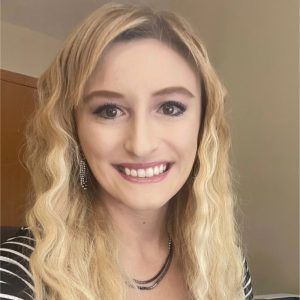Sponsored Content:
This content is not an endorsement from the ABTA.
Sponsored by Pacific Neuroscience Institute

“If Dr. Daniel Kelly would’ve been in China, I would’ve been in China!”
Although Chris would have preferred to stay local when he was diagnosed with a large, benign meningioma, he was determined to have a minimally invasive “keyhole” procedure to remove it. The major medical centers in his area only offered a traditional large craniotomy for his case.
Then, he and his wife found Daniel Kelly, MD, at Pacific Neuroscience Institute (PNI) in Santa Monica, Ca., who would perform the supraorbital (through the eyebrow) surgery he wanted. “So, it wasn’t just around the block,” commented Chris, who lives in Vidalia, Ga.
PNI leads the way in minimally invasive brain surgery, often sending patients home the next day
Notwithstanding COVID, patients like Chris have more options to receive multidisciplinary treatment from experts worldwide. Patients can seek second opinions at high-volume brain tumor centers of excellence, such as Pacific Brain Tumor Center at Pacific Neuroscience Institute, effectively expanding access for those living in cities without experienced neurosurgery teams. This becomes most relevant in rural regions and for those living in countries with limited resources.

In a recently published, groundbreaking 13-year study of keyhole surgery of meningiomas, results demonstrated that PNI patients experience outstanding clinical outcomes with lower surgical complication rates and higher rates of functional preservation.
Factors like these along with shorter hospital stays achieved due to streamlining protocols developed during the pandemic, and earlier return to work, have resulted in medical tourism for complex procedures, including brain surgery, which is being widely accepted by large health systems and insurers.
Is air travel safe for brain tumor patients?
Air pressure changes that occur on high-altitude flights have been a particular concern for patients with brain tumors because of brain swelling (edema), which have the potential of causing major symptoms during flight. In the only study of its kind, PNI reported that air flight is safe overall.
However, careful consideration by both doctor and patient is always essential prior to flying. For larger tumors, preflight and inflight steroids to reduce brain edema should be considered, as well as anticonvulsant administration to reduce seizure risk.

In some patients with very large brain tumors already causing cranial pressure, air flight may not be recommended, and patients should have discussions with their neurosurgeon or neuro-oncologist to ensure individual safety.
Chris flew out to Santa Monica without any issue, had brain surgery, and got back to work at his music store in Vidalia within a couple of weeks. “I made the right decision,” he said. The scar is virtually invisible, tucked into his left eyebrow, and a year later his MRI showed complete brain recovery.
Resources beyond surgery
PNI strives to provide compassionate and state-of-the-art clinical care for each patient. While many brain tumors may be removed in their entirety through minimally invasive keyhole surgery, others require additional treatments including chemotherapy, immunotherapy, radiation and/or clinical trial options. The robust lineup of clinical trials brings novel therapeutics to patients including those with primary brain tumors like glioblastoma, as well as patients with cancers that have metastasized to the brain from primary cancers such as breast, lung, and skin. With supportive care resources, as well as long term follow-up care, patients can be confident that they are putting their brain care into the most capable hands.
About Pacific Neuroscience Institute
Pacific Neuroscience Institute (PNI) is devoted to the comprehensive care of patients with a wide spectrum of neurological and cranial disorders. Dedicated teams of specialists, state-of-the-art facilities, and the use of leading-edge treatment along with our collaborative approach ensure that each patient receives the attention they require for successful treatment and recovery. PNI’s specialty clinics are located at award-winning hospitals Providence Saint John’s Health Center in Santa Monica and Providence Little Company of Mary Medical Center in Torrance, Ca. PacificNeuro.org
Useful links:
1. Thakur JD, Mallari RJ, Corlin A, Yawitz S, Eisenberg A, et al. Critical appraisal of minimally invasive keyhole surgery for intracranial meningioma in a large case series. PLOS ONE 17(7): e0264053 (2022).
2. Mallari RJ, Avery MB, Corlin A, Eisenberg A, Hammond TC, et al. Streamlining brain tumor surgery care during the COVID-19 pandemic: A case-control study. PLOS ONE 16(7): e0254958 (2021).
3. Thakur, J.D., Corlin, A., Mallari, R.J. et al.Complication avoidance protocols in endoscopic pituitary adenoma surgery: a retrospective cohort study in 514 patients. Pituitary 24, 930–942 (2021).
4. Phillips, M., Saria, M., Eisenberg, A. et al.Safety of commercial airflight in patients with brain tumors: a case series. J Neurooncol 139, 617–623 (2018).
5. Pacific Brain Tumor Center at Pacific Neuroscience Institute

Jessie Schlacks
Jessie is Managing Editor of the bi-monthly e-newsletter MindMatters. Submit story ideas or questions to jschlacks@abta.org.


















